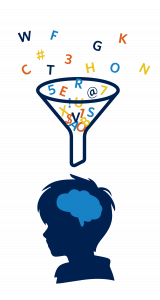What is Executive Function?
Executive function is the foundation for academic proficiency because it describes our ability to engage in goal-oriented behavior that culminates in a product or achievement. The term “executive functions” was created by Karl Pribram in the 1970s through his research that attempted to understand the role of the prefrontal cortex (Barkley, 2012). Although there are many definitions of executive function, the general consensus is that the executive functions of the brain work together, often as a series of clusters, areas or processes, to coordinate our ability to set goals, manage our emotions, and work toward achieving those goals.
Impact on Schooling
Landmark Outreach has publications that synthesize the research and outline how to best support students’ executive function processes in the classroom. According to Patricia W. Newhall author of Language-Based Learning Series: Executive Function: Foundations for Learning and Teaching, “Executive Function is the brain’s ability to coordinate the cognitive and psychological processes needed to initiate, sustain, monitor and adapt the behaviors and attitudes required to achieve a goal” (2012, p.2). In essence, our executive function processes enable us to complete tasks, particularly assignments such as long-term projects and essays.
Newhall also writes that when thinking about the impairment of executive function processes, educators should determine whether executive function processes are the primary weakness or symptomatic of an underlying skill deficit. Students may have “bottom-up” or “top-down difficulties” (Newhall, 2012, p. 3-4)
- “Bottom-up difficulties” are more often seen with students who have language processing issues. In this model, their language skill sets are so impaired that they often become unable to reach the actual goal. For instance, if a student is given the goal of writing a paragraph, their executive function processes may be overwhelmed or unable to support the task because their language skills impede their ability to produce a written paragraph.
- On the other hand, “top-down difficulties” reflect a student’s difficulty with specific executive function processes rather than language-based skills. For example, a student may be unable to write a paragraph because they struggle to initiate the task or sustain their focus.
It is important for teachers to understand the origin of students’ difficulties so that they can scaffold instruction effectively. Teachers can share strategies that support executive processes development so students can manage the complex academic demands placed on them.
For example, reflection on the building of executive function processes in the classroom lends itself well to the sixth Landmark Teaching Principle™: Include the Student in the Learning Process. Recognition and awareness of strengths and weaknesses within the executive functions involves the student’s ability to reflect and be metacognitive about their abilities.
Well-Known Executive Function Theorists:
Dr. Thomas E. Brown explains executive function in terms of a music conductor: “Regardless of their expertise, the musicians need a competent conductor who will select the piece to play, make sure they start playing at the same time and stay on tempo, fade in the strings and then bring in the brass, and manage them as they interpret the music. Without an effective conductor, the symphony will not produce good music” (Brown, 2007, p.23). In other words, Dr. Brown believes that we need a “conductor” to coordinate what he believes are the six clusters of executive function, activation, focus, effort, emotion, memory, and action to achieve goals. Brown’s widely circulated article, Executive Functions: Describing Six Aspects of a Complex System, explains these clusters and their impact.
Dr. Russell A. Barkley’s theories focus on 7 core skills. He believes that individuals with intact executive function skills exhibit the following when working towards a goal: Self-awareness, Inhibition, Non-Verbal Working Memory, Verbal Working Memory, Emotional Self-Regulation, Self-Motivation, and Planning and Problem Solving. Watch his video below to learn more about how these areas work to support the executive functions:
A video transcript is available: Transcript for ADHD and Executive Function – Dr. Russell Barkley | Child Mind Institute.
A closed-captioned version of this video is available: ADHD and Executive Function – Dr. Russell Barkley | Child Mind Institute (CC).
Peg Dawson and Richard Guare state in their book Executive Skills in Children and Adolescents: A Practical Guide to Assessment and Intervention (2018) that “Executive skills allow us to organize our behavior over time and override immediate demons in favor of longer-term goals. Through the use of these skills we can plan and organize activities, sustain attention, and persist to complete a task. Executive skills enable us to manage our emotions and monitor our thoughts in order to work more efficiently and effectively. Simply stated, these skills help us to regulate our behavior” (Dawson and Guare, 2018, p. 3). They believe the following five skills are necessary to set and achieve goals and solve problems: planning, organization, time management, working memory, and metacognition, and that the following skills help us see the task to the end: response inhibition, emotional control, sustained attention, task initiation, flexibility, and goal-directed persistence. To understand more about how these areas work together to help coordinate the executive functions, read this article.
 Dr. Lynn Meltzer’s theory of executive function focuses on the cognitive processes that help with goal setting, cognitive flexibility and flexible thinking, organizing and prioritizing, working memory, and self-monitoring (Meltzer, 2010, 2014, 2018). Meltzer illustrates executive function difficulties using the image of a funnel to explain how easily students with executive function challenges can become overwhelmed with information. She writes: “Students who struggle with these executive function processes often experience frustration and failure. They begin to feel that their brains are ‘clogged’ with information. Executive function strategies help students to ‘unclog the funnel’ and prevent increasing difficulties as the complexity and pace to the curriculum intensify” (Meltzer, 2010, 2015, 2018).
Dr. Lynn Meltzer’s theory of executive function focuses on the cognitive processes that help with goal setting, cognitive flexibility and flexible thinking, organizing and prioritizing, working memory, and self-monitoring (Meltzer, 2010, 2014, 2018). Meltzer illustrates executive function difficulties using the image of a funnel to explain how easily students with executive function challenges can become overwhelmed with information. She writes: “Students who struggle with these executive function processes often experience frustration and failure. They begin to feel that their brains are ‘clogged’ with information. Executive function strategies help students to ‘unclog the funnel’ and prevent increasing difficulties as the complexity and pace to the curriculum intensify” (Meltzer, 2010, 2015, 2018).
In other words, students with executive function challenges often feel that their brains are overwhelmed with information. When they are expected to complete tasks related to the processing of information, they often can’t figure out where and how to begin, determine ways to solve problems when they arise, or to persevere when they are stuck. She suggests that students need explicit strategies related to goal-setting, prioritizing and organizing, shifting flexibility, accessing information in working memory, and self-monitoring to help them manage classroom demands. To understand more about Meltzer’s thinking related to how executive function skills support literacy, explore this article.
References:
Barkley, R.A. (2012). Executive functions: what they are, how they work, and why they evolved. Guilford Press.
Brown, T.E. (2007). A new approach to attention deficit disorder. Educational Leadership. 64, 22-27.
Dawson, P.,& Guare, R. (2018). Executive skills in children and adolescents: a practical guide to assessment and intervention. Guilford Press.
Meltzer, L., & Greschler, M. (2016). Executive Function Strategies: The Building Blocks for Reading to Learn – International Dyslexia Association. Dyslexiaida.org. https://dyslexiaida.org/executive-function-strategies-the-building-blocks-for-reading-to-learn/
Newhall, P.W. (2014). Executive function: foundations for teaching and learning. Landmark School Outreach Program.



